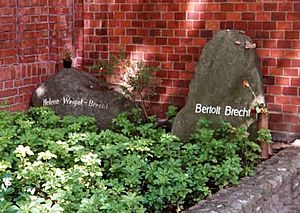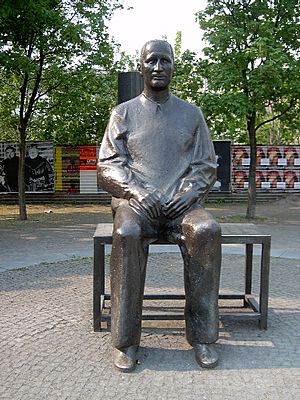Bertolt Brecht facts for kids
Quick facts for kids
Bertolt Brecht
|
|
|---|---|
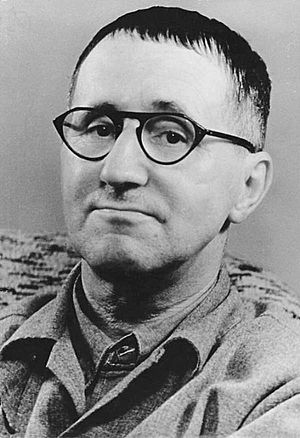
Brecht in 1954
|
|
| Born | Eugen Berthold Friedrich Brecht 10 February 1898 Augsburg, Bavaria, German Empire |
| Died | 14 August 1956 (aged 58) East Berlin, East Germany |
| Occupation |
|
| Nationality | German |
| Genre |
|
| Literary movement | Non-Aristotelian drama |
| Notable works |
|
| Spouses | |
| Children |
|
| Relatives | Walter Brecht (younger brother) |
| Signature | |
Bertolt Brecht (born Eugen Berthold Friedrich Brecht, February 10, 1898 – August 14, 1956) was a famous German writer, known for his plays, poems, and theatre ideas. He grew up during a time of big changes in Germany.
Brecht became well-known as a playwright in Munich and later moved to Berlin in 1924. There, he wrote The Threepenny Opera with Kurt Weill, which became a huge success. He also worked closely with composer Hanns Eisler for many years. Brecht was very interested in Marxism, a way of thinking about society and economics. He developed a new style of theatre called "epic theatre", which aimed to make audiences think critically.
When the Nazis came to power, Brecht had to leave Germany. He lived in different countries, including Scandinavia and the United States, during World War II. After the war, he returned to East Berlin. With his wife, the actress Helene Weigel, he started a theatre company called Berliner Ensemble.
Contents
Bertolt Brecht's Early Life
Growing Up in Bavaria (1898–1924)
Eugen Berthold Friedrich Brecht was born on February 10, 1898, in Augsburg, Germany. His mother was a devoted Protestant, and his father was a Roman Catholic. Their home was a comfortable middle-class one. The house where he was born is now a museum.
Brecht's grandmother and mother taught him a lot from the Bible, which influenced his writing throughout his life. At school in Augsburg, he met Caspar Neher. They became lifelong friends and creative partners. Neher designed the stage sets for many of Brecht's plays, helping to create the unique look of his "epic theatre."
When Brecht was 16, World War I began. At first, he was excited, but he soon changed his mind after seeing his classmates join the army. In 1915, he almost got expelled from school for writing an essay that criticized the idea of dying for one's country. A priest who was also a teacher helped him avoid expulsion.
To avoid being drafted into the army, Brecht enrolled in a medical course at Munich University in 1917. There, he studied drama and admired the playwright Frank Wedekind.
Brecht started writing newspaper articles under the name "Bert Brecht" in 1916. In 1918, he was briefly a medical orderly in the army, but the war ended a month later.
In 1919, Brecht had a son, Frank, with Paula Banholzer. Sadly, Frank died in 1943 while fighting in World War II. Brecht's mother passed away in 1920.
Around 1920 or 1921, Brecht worked briefly in a political comedy show with Munich comedian Karl Valentin. Brecht admired Valentin's acting style.
Brecht's first full play, Baal, was written in 1918. He often wrote plays as a way to respond to other works or ideas. He once joked, "Anyone can be creative, it's rewriting other people that's a challenge." He finished his second major play, Drums in the Night, in 1919.
In 1922, a famous critic named Herbert Ihering praised Brecht's play Drums in the Night. He said Brecht had brought "a new tone, a new melody, a new vision" to German writing. Brecht won the important Kleist Prize for his first three plays. That same year, he married opera singer Marianne Zoff. Their daughter, Hanne Hiob, born in 1923, also became a successful actress.
In 1923, Brecht wrote a story for a short comedy film called Mysteries of a Barbershop. It starred Karl Valentin and is now seen as an important film in German history. His play In the Jungle also premiered in Munich that year. The opening night was very noisy, with some people protesting loudly.
In 1924, Brecht worked with writer Lion Feuchtwanger to adapt Christopher Marlowe's play Edward II. This was a big step for Brecht, as it was his first time directing a play by himself. He later said it helped him develop his idea of "epic theatre." That September, he moved to Berlin to work at the Deutsches Theater, one of the world's leading theatres.
Life in Berlin (1925–1933)
Brecht's marriage to Marianne Zoff ended in 1927. He then became involved with Helene Weigel, and their son, Stefan, was born in 1924.
In Berlin, Brecht started working with a group of friends and artists. This team helped him create his plays. This way of working together was a key part of his artistic process.
In 1925, Brecht was inspired by two films: Chaplin's The Gold Rush and Eisenstein's Battleship Potemkin. He felt Chaplin's acting style was close to what he wanted for his "epic theatre."
Brecht began to study Marxism, a political and economic theory, in 1926. He said that reading Marx helped him understand his own plays better. He wrote several plays that supported socialist ideas, focusing on themes like teamwork and social change.
In 1927, Brecht joined the theatre company of Erwin Piscator, a director known for his political and documentary-style theatre. Brecht learned a lot from Piscator's productions, especially about using stage technology like projections.
The year 1927 also marked the start of Brecht's work with composer Kurt Weill. They created The Little Mahagonny, a short musical piece. They believed that words, music, and visuals should all be separate but work together.
In 1930, Brecht married Helene Weigel. Their daughter, Barbara Brecht, was born soon after. She also became an actress and later helped manage her father's works.
Brecht's writing team created many "teaching plays" (Lehrstücke). These plays were meant to teach audiences about social issues, especially for workers' groups in Germany. His famous play, Saint Joan of the Stockyards, explored the world of finance.
His team also adapted The Beggar's Opera by John Gay. With music by Kurt Weill, it became The Threepenny Opera (Die Dreigroschenoper). This play was a huge hit in Berlin in the 1920s and changed musical theatre around the world. One famous line from the play highlights the idea that people need food before they can worry about being good:
|
Erst kommt das Fressen |
First comes eating |
After this success, they quickly made Happy End, but it was not as popular. However, its songs, like "Der Bilbao-Song," became hits.
The most important work by Brecht and Weill was the opera Rise and Fall of the City of Mahagonny. When it premiered in 1930, it caused a stir, with some people protesting. But when it opened in Berlin in 1931, it was a big success.
In his final years in Berlin (1930–1933), Brecht continued to work on his "teaching plays." He also worked on a film called Kuhle Wampe (1932), which showed the effects of unemployment. This film is known for its humor and music by Hanns Eisler.
Living in Exile (1933–1945)
Brecht left Germany in February 1933, right after Hitler came to power, because he feared being persecuted. After staying in a few different cities, he and Weigel moved to Denmark. They lived there for six years, often hosting other writers and artists.
As war seemed likely in 1939, Brecht moved to Sweden, then to Finland. He waited there for a visa to the United States until May 1941. During this time, he wrote the play Mr Puntila and his Man Matti.
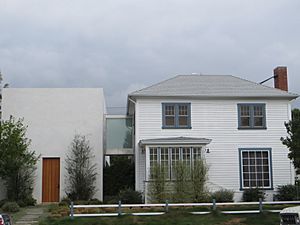
During World War II, Brecht became an important writer living in exile. He wrote many famous plays that showed his opposition to the Nazi movement. These include Life of Galileo, Mother Courage and Her Children, The Good Person of Szechwan, and The Caucasian Chalk Circle.
Brecht also helped write the screenplay for the film Hangmen Also Die! (1943). This movie was about the assassination of a high-ranking Nazi official. The film's music was nominated for an Academy Award. This collaboration showed how German artists living in exile influenced American culture. The money he earned from this film allowed him to write more plays.
After the War: East Germany (1945–1956)
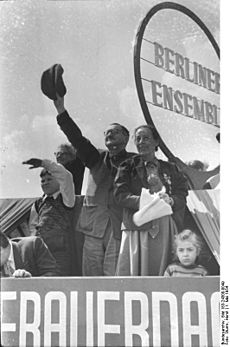
After the war, during the Cold War period, Brecht was questioned by the House Un-American Activities Committee in the United States. This committee was looking for people they thought were involved in communism. Brecht testified in October 1947, stating he was not a member of the Communist Party. He made jokes during the hearing, pretending his English wasn't good. The day after his testimony, he left for Europe.
He lived in Switzerland for a year. In 1948, he staged his adaptation of Sophocles' Antigone, explaining his ideas about "non-Aristotelian" theatre.
In 1949, Brecht moved to East Berlin and started his theatre company, the Berliner Ensemble. His wife, Helene Weigel, was a key part of this company. He kept his Austrian citizenship and bank accounts from outside East Germany.
Brecht had been influenced by Marxism throughout his life. In 1954, he received the Stalin Peace Prize. His connection to Marxist ideas made him a controversial figure in some places.
In his final years in East Berlin, Brecht wrote fewer plays. He focused on directing and helping new, young directors and writers. He also wrote some of his most famous poems, like the "Buckow Elegies."
Brecht died on August 14, 1956, at age 58, from a heart attack. He is buried in the Dorotheenstadt Cemetery in Berlin, near the home he shared with Helene Weigel.
It is believed that Brecht had heart problems since childhood, which affected his health throughout his life. Despite his physical challenges, he was able to create amazing artistic works.
Brecht's Theatre Ideas
Brecht developed a special way of making theatre called "Epic theatre". He wanted plays to make the audience think about political ideas and social problems.
In epic theatre, Brecht did not want the audience to get lost in their emotions or feel exactly what the characters felt. Instead, he wanted them to think carefully and critically about what they saw. He believed that if people just felt emotions, they would leave the theatre without thinking about real-world problems. He wanted his audience to see social unfairness and then be inspired to change things outside the theatre.
To do this, Brecht used techniques to remind the audience that they were watching a play, not real life. He wanted them to know that the play was a "representation" of reality, not reality itself. By showing that the play was constructed, he hoped to show that their own reality was also constructed and could be changed.
One of Brecht's most important ideas was the Verfremdungseffekt, which means "defamiliarization effect" or "distancing effect." This meant making everyday things seem strange or new, so people would look at them with fresh eyes and curiosity. To achieve this, actors might speak directly to the audience, the stage lighting might be very bright, songs might interrupt the story, or signs might explain things.
Brecht was also influenced by Chinese theatre. He saw how Chinese actors could show strong emotions without getting carried away themselves. He used this idea to support his Verfremdungseffekt.
Brecht used his poetry to criticize European culture, including the Nazis and the wealthy class in Germany. His poems often reflected the impact of World War I and World War II.
Many of his plays included poems set to music. His collection of poems, Manual of Piety, helped establish him as a noted poet.
Brecht's Legacy
After Brecht's death, his wife, Helene Weigel, continued to run the Berliner Ensemble theatre company until she passed away in 1971. The company mainly performed Brecht's plays.
Brecht was not only an important playwright and poet, but also a significant thinker in political and social philosophy.
His collaborations with Kurt Weill have even influenced rock music. For example, the "Alabama Song" from his play Mahagonny has been recorded by famous bands like The Doors and David Bowie.
Brecht's son, Stefan Brecht, became a poet and theatre critic, interested in new and experimental theatre in New York.
People Brecht Worked With
Brecht often worked with many other talented people. He believed in working together as a team. This group of collaborators helped create the unique "Brechtian" style. He had long-lasting creative relationships with writers, composers, designers, directors, and actors. Some of his key collaborators included:
- Ruth Berlau
- Paul Dessau
- Slatan Dudow
- Hanns Eisler
- Erich Engel
- Elisabeth Hauptmann
- Charles Laughton
- Lotte Lenya
- Peter Lorre
- Caspar Neher
- Erwin Piscator
- Margarete Steffin
- Helene Weigel
- Kurt Weill
Brecht's Works
Stories
- Stories of Mr. Keuner
- Threepenny Novel (1934)
Plays and Screenplays
Here are some of Brecht's most famous plays and screenplays:
- Baal (1918)
- Drums in the Night (1918–20)
- A Respectable Wedding (1919)
- Mysteries of a Barbershop (screenplay) (1923)
- In the Jungle of Cities (1921–24)
- The Life of Edward II of England (1924)
- Man Equals Man (1924–26)
- The Threepenny Opera (1928)
- The Rise and Fall of the City of Mahagonny (1927–29)
- The Decision (1930)
- Saint Joan of the Stockyards (1929–31)
- Kuhle Wampe (screenplay) (1931)
- The Seven Deadly Sins (1933)
- Fear and Misery of the Third Reich (1935–38)
- Life of Galileo (1937–39)
- Mother Courage and Her Children (1938–39)
- Mr Puntila and his Man Matti (1940)
- The Good Person of Szechwan (1939–42)
- The Resistible Rise of Arturo Ui (1941)
- Hangmen Also Die! (screenplay) (1942)
- The Caucasian Chalk Circle (1943–45)
- Antigone (1947)
- The Days of the Commune (1948–49)
Important Writings on Theatre
- The Modern Theatre Is the Epic Theatre (1930)
- A Short Organum for the Theatre (1948)
Poetry
Brecht wrote hundreds of poems throughout his life. He started writing poetry as a young boy. His poems were influenced by folk songs and other poets. His last collection of new poetry published during his lifetime was Svendborger Gedichte (1939).
Some of Brecht's poems:
- Alabama Song
- Children's Crusade
- Children's Hymn
- In Praise of Doubt
- In Praise of Learning
- Mack the Knife
- My Young Son Asks Me
- O Germany, Pale Mother!
- Questions from a Worker Who Reads
- Reminiscence of Marie A.
- Solidarity Song
- The Book Burning
- The Solution
- To Posterity
- United Front Song
See Also
 In Spanish: Bertolt Brecht para niños
In Spanish: Bertolt Brecht para niños
- Epic theatre
- Weimar culture


